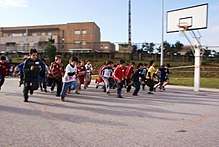BP ED Full Form stands for Bachelor of Physical Education, a specialized undergraduate degree designed to nurture individuals aspiring to become proficient physical education teachers and trainers.
What Does BPED Stand For?
- BP ED Full Form stands for Bachelor of Physical Education, a specialized undergraduate degree focused on physical education and sports sciences.
- It is an acronym for a comprehensive program that prepares individuals to become skilled physical education teachers and trainers.
- This degree emphasizes both theoretical knowledge and practical skills, ensuring graduates are well-versed in various sports, fitness techniques, and teaching methodologies.
- BPED programs cover subjects like sports science, anatomy, physiology, and pedagogy, providing a holistic understanding of physical education.
- Students pursuing BPED engage in practical sessions, honing their coaching abilities and gaining hands-on experience in teaching sports and fitness.
- The curriculum often includes internships and practical teaching assignments, allowing students to apply their knowledge in real-life educational settings.
- Graduates with a BPED degree can pursue careers as physical education teachers, sports coaches, fitness trainers, and sports administrators.



Historical Context of BP ED Full Form
| Year | Historical Milestones |
|---|---|
| 1920s | Emergence of Physical Education: The importance of physical education in schools gained recognition, leading to the development of specialized programs. |
| 1950s | Incorporation of Sports Sciences: BPED programs integrated sports sciences, anatomy, and physiology into the curriculum, enhancing the scientific understanding of physical education. |
| 1970s | Focus on Pedagogy: Emphasis shifted towards pedagogy, equipping future educators with effective teaching methodologies specific to physical education. |
| 1990s | Technological Integration: Advancements in technology influenced BPED, incorporating digital tools for sports analysis and fitness tracking. |
| 2000s | Global Standardization: BPED programs aligned with international standards, ensuring graduates’ qualifications were recognized globally. |
| Present | Holistic Approach: Modern BPED emphasizes holistic health, encompassing mental well-being, nutrition, and overall fitness, reflecting contemporary health consciousness. |
The Significance of BPED in Today’s Education
BPED holds immense importance in contemporary education, contributing significantly to the holistic development of students. Its significance is underscored by:
- Promoting Physical Fitness: BPED programs instill the value of physical fitness, combating sedentary lifestyles and promoting active living among students.
- Enhancing Mental Well-being: Physical activities incorporated into BPED foster mental resilience, reducing stress and enhancing overall well-being.
- Skill Development: BPED equips students with diverse skills, including sports proficiency, coaching abilities, and leadership qualities, enhancing their employability.
- Health Awareness: BPED curriculum imparts knowledge about nutrition, health, and lifestyle, fostering awareness about the importance of a balanced life.
- Community Building: BPED educators play a pivotal role in building supportive communities, emphasizing teamwork, discipline, and sportsmanship.
- Addressing Obesity: In an era of rising obesity rates, BPED programs contribute to the fight against obesity by encouraging regular physical activities.
Admission Requirements for BPED Programs
| Requirement | Details |
|---|---|
| Educational Background | Prospective students typically need a high school diploma or its equivalent. |
| Fitness Assessment | Applicants may undergo physical fitness tests to evaluate their overall fitness level. |
| Sports Proficiency | Demonstrated skills in various sports are often assessed through practical evaluations. |
| Written Examinations | Candidates may be tested on their knowledge of sports science, anatomy, and physiology. |
| Recommendation Letters | Letters from teachers or coaches highlighting the applicant’s passion and dedication. |
| Interviews | Personal interviews assess the candidate’s communication skills and enthusiasm for BPED. |
Curriculum and Course Structure
BPED programs offer a well-rounded curriculum, combining theoretical knowledge with practical training to prepare students for diverse roles in physical education and sports. The curriculum and course structure typically include:
- Core Subjects: Courses in sports science, anatomy, physiology, and pedagogy form the core, providing a deep understanding of the human body and effective teaching methodologies.
- Practical Sessions: Students engage in practical sessions, honing their skills in various sports, fitness activities, and coaching techniques under expert supervision.
- Internships: BPED programs often include internships in schools, sports clubs, or fitness centers, allowing students to apply their knowledge in real-world settings.
- Specializations: Some programs offer specializations in areas like sports management, adapted physical education, or sports psychology, enabling students to tailor their learning according to their interests.
- Research Projects: Students may undertake research projects, exploring topics related to sports science, physical fitness, or education, enhancing their analytical and critical thinking skills.
- Teaching Methodologies: Courses focusing on teaching methodologies equip students with effective ways to engage learners, create lesson plans, and assess students’ progress.
Frequently Asked Questions (FAQs)
BPED stands for Bachelor of Physical Education, a specialized undergraduate degree focused on physical education and sports sciences.
BPED programs cover a wide range of subjects including sports science, anatomy, physiology, pedagogy, and practical coaching techniques.
Graduates with a BPED degree can pursue careers as physical education teachers, sports coaches, fitness trainers, and sports administrators.
Yes, BPED programs are often standardized globally, enabling graduates to work internationally in the field of physical education and sports.
Typically, BPED programs span over three to four years, providing students with a comprehensive education in physical education and sports sciences.






